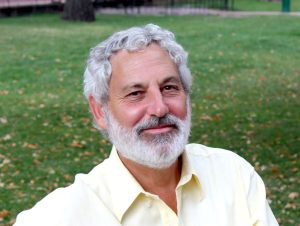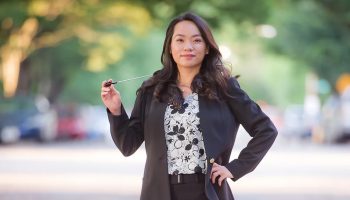
Roy Hoffman thinks stories have the capacity to reverberate across eras.
During his Week Six writer-in-residence reading on Sunday in the Hall of Philosophy, Hoffman read two nonfiction pieces: “The Enduring Ring” and “A Reunion with my Younger Hitchhiking Self.” Hoffman wore the eponymous ring of the first essay — a gold band that first belonged to his Romanian immigrant grandfather — as he read the two essays about ancestry and youth.
“Sometimes we have to meet our younger selves again to be propelled up and out into the big, boisterous world, making the road, however we define it, our own,” he read.
Hoffman, who is teaching an advanced prose workshop this week at the Chautauqua Writers’ Center titled “Journeys (Of the Heart and Page),” grew up in Mobile, Alabama, and lived in New York City for 20 years before returning south to Fairhope, Alabama, with his family in the late 1990s.
Journeys — the literary and the literal — have defined his life and body of work. A faculty member of Spalding University’s low-residency MFA in Writing Program in Louisville, Kentucky, Hoffman will give his evening lecture, “Making History Come Alive in Stories,” at 7 p.m. Wednesday, July 31 in Room 101 of the Hultquist Center.
“I’m extremely interested in the journeys we all make in our lives, through time as well as place, through relationships and communities, and through history,” he said. “I’ve addressed this theme in journalism and personal essays, as well as my three novels, Almost Family, with its backdrop of the Civil Rights Movement; Chicken Dreaming Corn, inspired by my grandparents’ sojourn as Eastern European Jews to early 1900s Alabama; and Come Landfall, about three women and their love stories, impacted by World War II, (and the wars in) Vietnam and Iraq.”
During his lecture, Hoffman will share stories from his experience researching the historical context of those three novels. He plans to focus on several other works — including a memoir, a history of the Civil War, and a novel from the 1960s about the 1930s — to analyze the techniques employed by authors to render the past “as vivid as today.” To conclude, he will offer writers suggestions to aid research work for their own historical stories.
“How can we, in 2019, connect with the past in a way that speaks to us with immediacy?” Hoffman asked. “Many historians not only martial the facts of the world before us — whether it be 50 or 500 years ago — but also render it with a sense of detail, and drama, that captivates and teaches. In turn, memoirists as eyewitnesses, and novelists through the imagination, set their tales in earlier times, transforming their experiences and research into what Henry James called a sense of ‘felt life.’ ”
For Hoffman, devoting such care to the writing of historical literature is not only of rhetorical significance, but also a vital public service.
“By making history come alive in stories, these authors have created writings that themselves have become part of the historical record,” Hoffman said.




